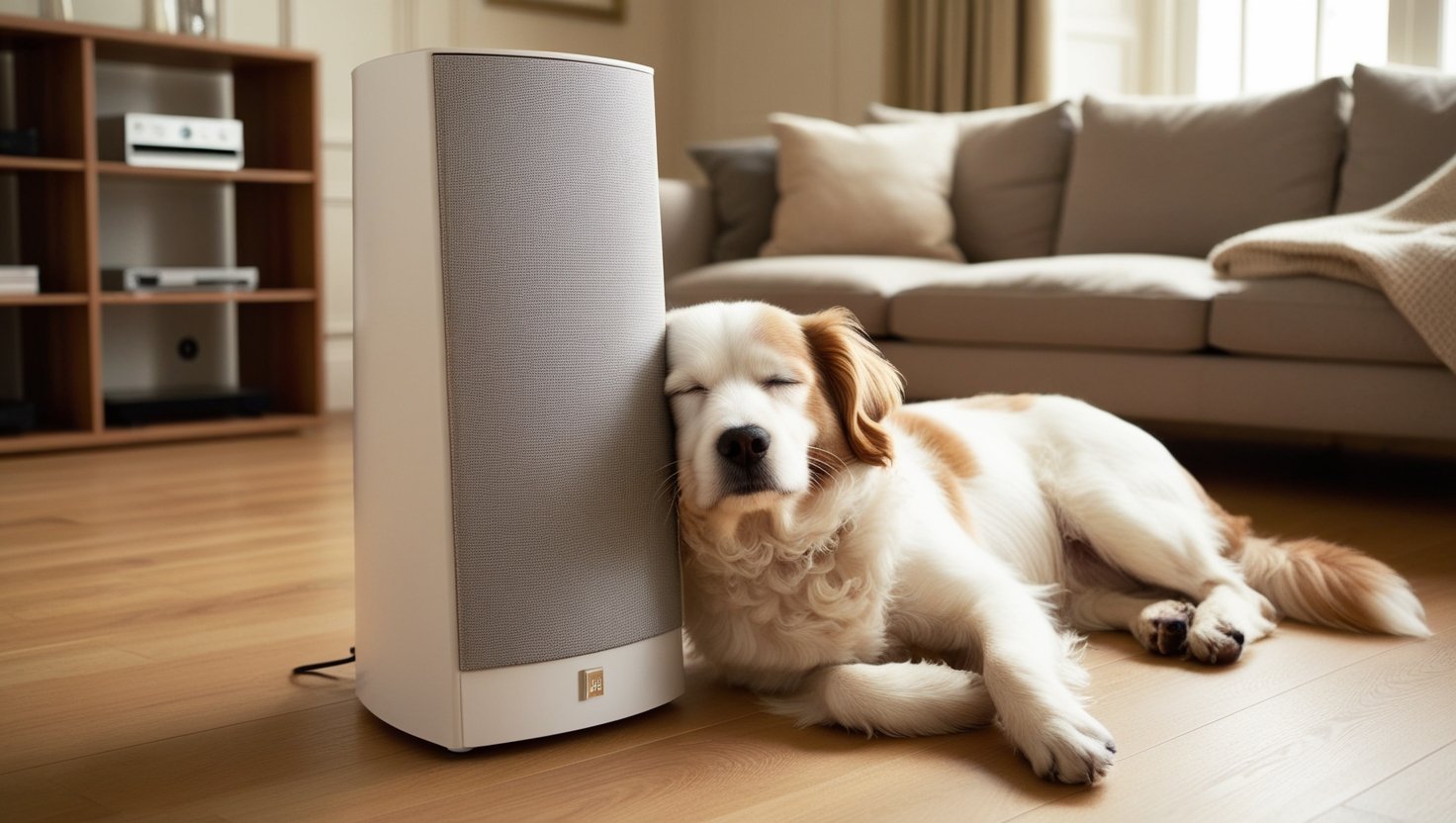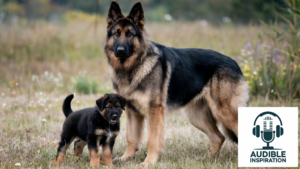Canine anxiety is a common issue for dog owners. Music therapy can be a helpful solution. Research shows certain types of music soothe anxious pups.
Studies reveal classical music, reggae, and soft rock reduce stress in dogs. The University of Glasgow found dogs listening to reggae showed fewer stress behaviors.
The Scottish SPCA played soft rock in shelters for a week. They noticed less barking and pacing among dogs. This suggests music can be effective for canine stress relief.
Music isn’t a cure-all for dog anxiety. However, it can be part of a broader treatment plan. Combined with other methods, music therapy might help your furry friend relax.

Understanding Canine Anxiety and Its Manifestations
Dogs can experience anxiety just like humans. Recognizing dog anxiety symptoms is crucial for pet owners. Canine stress can affect a dog’s behavior and overall wellbeing.
Common Signs of Anxiety in Dogs
Anxious dogs may show various behaviors that signal distress. These can include:
- Excessive barking or howling
- Destructive chewing or digging
- Urinating or defecating indoors
- Pacing or restlessness
- Aggression towards people or other animals

Causes of Separation Anxiety
Separation anxiety often stems from changes in routine or environment. Some factors include:
- Lack of proper socialization as puppies
- Traumatic experiences
- Changes in family structure or living situation
- Genetic predisposition
Separation anxiety affects about 14% of dogs. It’s a common issue for pet owners to address.
Impact on a Dog’s Wellbeing
Canine stress can greatly affect a dog’s quality of life. Anxious dogs may have trouble sleeping or settling down.
They might also eat less and have a weaker immune system. This can strain relationships with their owners or other pets.
Understanding canine anxiety is key to helping your furry friend. With proper care, many dogs can overcome anxiety and live happier lives.
The Science Behind Music Therapy for Dogs
Dogs can hear frequencies between 40 and 65,000 Hz. This keen hearing makes music therapy effective for managing canine anxiety. Research shows certain music types can deeply affect a dog’s emotions.
Classical music can help dogs relax. A 2002 study found dogs rested more when listening to classical tunes. This reveals a link between sound perception and emotional well-being in dogs.
Sound rhythms can influence the body’s natural patterns. Music at 60 beats per minute can slow brain waves, promoting relaxation. This effect works on both humans and dogs.
“Classical music, New Age, soft jazz, and other melodic music genres with a slow, even tempo are recommended for calming and relaxing anxious or agitated pets.”
Bioacoustics has led to new audio therapies for dogs. These special sounds can boost immune responses. They may help with tissue repair and fighting infections.
This new approach combines music’s calming effects with potential health benefits. It offers a promising way to support our canine friends’ well-being.
Types of Music That Can Soothe Anxious Dogs
Music can calm anxious dogs effectively. Various genres show positive effects on canine behavior. Let’s explore musical styles that help dogs relax.
Classical Music and Its Calming Effects
Classical music reduces stress in dogs significantly. Dogs prefer classical tunes over TV or radio broadcasts. The slow tempo matches a dog’s resting heart rate, promoting relaxation.
“I Dreamed” by Ferrox is a popular choice in pet playlists, appearing 102 times in recent studies.
Reggae and Soft Rock as Anxiety Reducers
Reggae music decreases anxiety-related behaviors in dogs. Research from the University of Glasgow supports this finding. Soft rock also helps calm dogs in shelter environments.
Specially Composed Canine Music
Canine-specific music addresses various dog needs. These compositions feature simple structures and soothing melodies. The Music My Pet CD offers re-orchestrated classical pieces for pet relaxation.
- Soft piano and gentle string instruments are preferred
- Low volume around 25 dB is recommended
- Longer durations of continuous music are more effective
Every dog is unique in their music preferences. Try different styles to find what suits your pet best. Consistency and a calm environment are crucial for successful music therapy.
How Music Affects a Dog’s Behavior and Physiology
Music strongly impacts dogs, changing their behavior and physical state. Studies show certain tunes can greatly reduce canine stress. Dogs often sleep more and bark less when hearing calming music.
Classical music soothes dogs in stressful settings. Over 70% of dogs showed changes when exposed to various music genres. Amazingly, 83.56% of these dogs displayed positive physical and behavioral shifts.
Music has notable effects on dogs’ bodies. Calming tunes can lower cortisol, a stress hormone. They also increase heart rate variability, showing reduced stress levels.
“Music therapy shows promise in veterinary medicine due to its cost-effectiveness and ease of implementation.”
The structure of music affects how dogs react. Quick, short notes can cause rapid movements. Simple tones, rhythms, and long notes encourage calm behavior.
This knowledge helps manage canine anxiety in shelters and vet offices. It offers a cheap, easy way to improve dog welfare.
- Classical music has a calming influence on dogs
- Music can decrease cortisol levels in dogs
- Simple tones and sustained notes promote relaxation behaviors
Music therapy is becoming a valuable tool for reducing stress in dogs. It’s helping to improve overall canine well-being as research grows.
Implementing Music Therapy for Dog Anxiety Problems
Music therapy can help manage dog anxiety effectively. It creates a calming environment through sound, reducing stress levels. Let’s explore how to use this soothing technique.
Creating a calming playlist for your dog
Choose genres known to relax dogs when building a playlist. Reggae and soft rock have shown great results in reducing canine stress. Classical music is also an excellent choice.
Avoid heavy metal or music with loud, sudden noises. These might startle your pet. Rotate the playlist weekly to maintain its calming effects.
Proper timing and duration of music sessions
Start playing calming music 30 minutes before a stressful event. This helps your dog associate the music with relaxation. Keep the volume low and consistent.
For senior dogs with hearing issues, try specially designed soundtracks. “Elderly Canine” by iCalmPet can reduce anxiety without causing stress.
Combining music with other anxiety-reducing techniques
Use music therapy as part of a multi-modal anxiety treatment approach. Pair it with strategies like creating a quiet space or using white noise.
For puppies, introduce various sounds positively to prevent future noise phobias. If anxiety persists, consult a vet for professional guidance.






